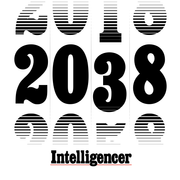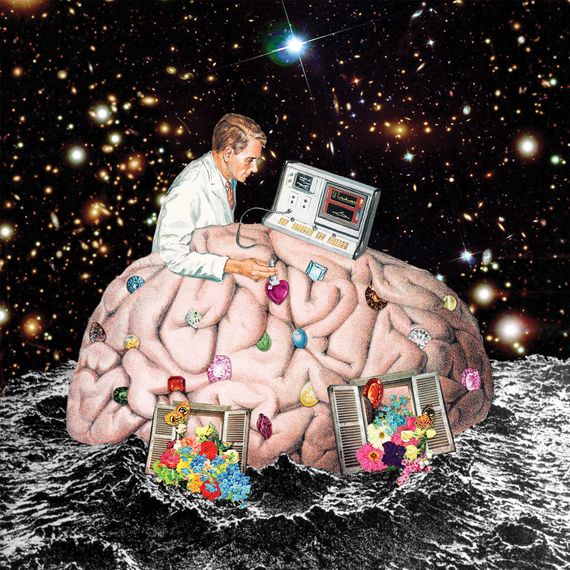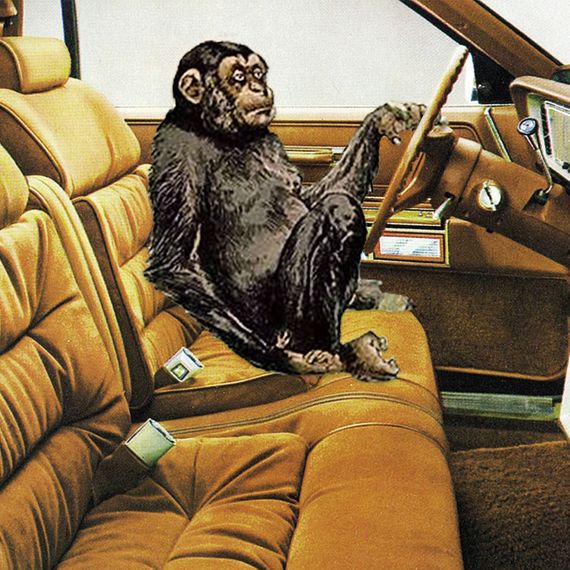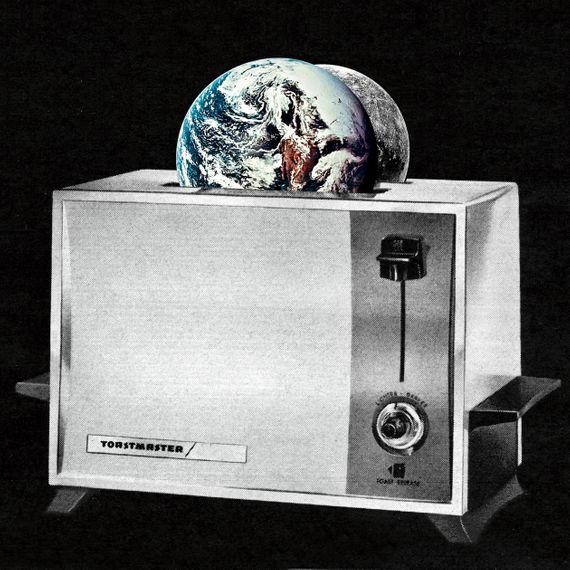
This month, we are all tentatively dipping our toes into the New Year, wondering what horrors and highlights might await us in 2019 — the year that served as a setting, you may remember, for Blade Runner, Akira, and Running Man, three of the most iconic future-casting movies ever made and now divergent choose-your-own-dystopia visions of the years ahead (perhaps some more plausible than others). They are also reminders that, though Americans today may have a hard time imagining a future all that different from the present — we dream less about flying cars and space travel than about somewhat improved health care and slightly more immersive video games — it was not all that long ago that we believed (sort of) that very wild futures were possible just a decade or two down the road. Which is part of what inspired us, this fall, to ask a panel of visionaries from the worlds of tech, sex, the law, and international affairs to make some pretty radical propositions about what the world could look like in 20 years. The result was an eight-episode podcast called 2038. Some predictions were cheekier than others, some scarier; on the occasion of the New Year, and the optimism and future panic it invariably brings, we’ve excerpted those predictions here.
In 2039…
Dahlia Lithwick: The Supreme Court Will Die Off
In 2039, the Supreme Court will consist of two people: Elena Kagan and Neil Gorsuch, because no one else will ever be confirmable again, and gradually the other justices will retire or die off.
Democrats are all saying that they want the filibuster reestablished really soon. I think everybody has come to realize that confirming people by 50-48 margins is not good for anyone. But we’re also moving quickly away from anything that looks like a consensus nominee. And the paradox is, we will put up people who are 40. Clarence Thomas famously responded to the idea that he might move left over time, the way Souter and Stevens did, by telling his clerks, “I ain’t evolving.” Now nobody’s evolving — in any direction.
We haven’t had a Court, certainly in my career, that didn’t have a swing justice on it. The new one, with Brett Kavanaugh confirmed, will be the first. Because, guess what: John Roberts is not a swing justice. And when we talk about the public estimation of the Court, that’s incredibly consequential. We are going to have enshrined in stone a 5-4 Court. Nobody’s ever going to put up a centrist again. Nobody’s ever going to put up anyone who’s in play again.
By 2039, the Supreme Court basically doesn’t matter anymore. It’s just wallpaper. We have very fanciful ideas about a protective, progressive Supreme Court, and that is almost entirely a function of a chunk of time in the 1960s and ’70s. The truth is, for almost all of history, the Court was protecting monied business interests at the expense of minorities. And we survived. But from the 1960s and ’70s, progressives got this notion that the Court was going to save us. More recently, Democrats thought we were winning because of the Obergefell gay-marriage case. But actually, we’ve lost everything, including the right to free and fair elections. We might continue to lose. There’s been a 40-year laser focus on the political right around the Court. There has been an absolute sucking noise on the left around the same issue. We had a 4-4 Court for a year, and I didn’t see Americans going to the polls over it. I didn’t see anybody thinking about it.
Dahlia Lithwick is a journalist covering law and the Supreme Court for Slate and the host of the Amicus podcast.
Kate Julian: There Will Be a Lot Less Sex and a Lot More Masturbation
In the future, the ebbing of romantic and sexual connections will continue. People will have sex less frequently than they did in the pre-internet era, which will be remembered as a more carnal time. They will have fewer lifetime sexual partners, and they will be more likely to be abstinent. Only a minority of teenagers will have sex of any sort. Masturbation and other varieties of solo sex will continue to be more prevalent than they were before; porn aficionados will enjoy VR sex and sex robots. Like many other aspects of our world in the decades to come, the gap between the haves and have-nots will continue to grow. Those who have many advantages already will be disproportionately likely to find romantic and sexual partners if they desire them and to have fulfilling sex lives. There will be good parts of this: Nonconsensual sex will be far less common than it is today. There will be little to no social stigma attached to being unattached. Those who approach singledom with psychological and financial advantages will flourish. It will be the best time in human history to be single. But there will be less unambiguously positive developments as well: For better and for worse, the birth rate will continue to fall, and those who are less suited to solo life will suffer from profound loneliness.
If you compare Americans’ sex lives today to the sex lives of people of the same age in the early ’90s, people who are now in their 20s are on track to have fewer lifetime sexual partners. They’re having sex less frequently. They’re about two and a half times as likely to be abstinent, and they have launched their sex lives later. It would seem that something is getting in the way of people’s ability or desire to connect to each other physically.
In The Atlantic, I called this a sex recession. Its biggest cause is that more people than not who are under 35 are living without any sort of partner, which is a change from decades past. The most common living arrangement for adults who are under 35 is to be living with a parent, which, I think it is safe to say, is for many of us probably not a great recipe for a superactive and fulfilled sex life.
Other factors include media, broadly — not just social media and not just porn. I would put any kind of digital occupation that makes it less desirable to go out and connect with somebody in person in the same category. It could be Netflix, streaming TV — all of these things coincide with a measured increase in the percentage of people who say that they’ve masturbated in the past week. Among men, that’s doubled since the early ’90s. Among women, it’s tripled.
Another set of causes when we’re looking at teens specifically has to do with the way adolescence has changed: Teenagers are having sex later, and the teen birth rate is a third of what it was in the early ’90s. People are more likely to say their first sexual experience was consensual. People seem to be coming into their 20s with less romantic experience than past cohorts. That can be a really difficult thing to reverse. I’ve never held hands with somebody, I’ve never kissed somebody; how do I do that when I’m 23, 24, 25? A third big category has to do with dating apps, which have become a normal way to meet people in a lot of circles. And yet for some people, they are clearly functioning really poorly and maybe sort of paradoxically actually making it harder to match up with people. That will continue.
Kate Julian is an editor at The Atlantic, where her “The Sex Recession” was a recent cover story.
An Xiao Mina: There Will Be an Internet Cold War
In the year 2039, the globe — what remains of it anyway — will be cut up into two halves. People in different countries will log on to substantially different internets governed by different laws and regulations, limited in different ways, and animated by their own distinct cultures. Some sites will be unavailable in certain places — this is already the case but will become much more dramatically so. Some sites will be subject to more censorship. Some will be much less popular — or more. But most nations will align their internets with one of two superpowers. One half belongs to the Libre Web, a U.S.-led federation of internet-savvy states promoting a supposedly free but surveilled internet rife with hate groups and hyperpartisans. The other half belongs to the Tranquil Net — a China-led alliance of nations committed to an internet free of dissent and disagreement. Mutual distrust between the Libre Web and the Tranquil Net has led to a sundering of digital ties, and two parallel internets operate, each supervised by one of the two superpowers. Welcome to the world’s first digital Cold War.
On the Libre Web, surveillance is identity-based — different communities are the objects of different levels of surveillance. On the Tranquil Net, surveillance is more active — broad censorship and information control. We’re already seeing this dynamic in places like China and Iran.
If we look at the history of the Cold War, it was as much a game of propaganda as it was of the actual threat of destruction and proxy wars. I imagine we will see new forms of digital propaganda. And just as with the historic Cold War, there might be digital neutral zones — imagine places like Singapore, Kenya, Brazil, places that already have strong digital cultures and the resources to develop alternative infrastructures.
You will see the emergence of digital moles. How does an uneasy balance of trust play out? To really secure the internet, you will need to tie it to people’s biometrics. And so we will see the emergence of an online self tied to your offline self. On the internet, you can no longer hide that you’re not a dog.
An Xiao Mina is a technologist, writer, artist, and an affiliate researcher at Harvard’s Berkman Klein Center for Internet and Society.
Paul Ford: Everything Will Be a Computer
You won’t have a computer, because everything will be computerized.
Computers will be small and cheap, embedded in everything, and all the little rituals that I do to get through my day — like swiping a MetroCard or buzzing into the office — are going to be unnecessary. I might still use a desktop computer to make software. But mostly I’m going to ask my earbuds to play music, and those earbuds might also serve as a wallet. And my shoes will talk to my earbuds, and the song will speed up if I walk faster. I’ll be just a little walking cloud platform with lots of hard-drive space all talking to the internet.
Companies like Apple, Microsoft, and Google will still exist but will need to fight to stay relevant in a world where people just don’t need that much more of what those companies sell. The pressure Apple is going to feel is that all operating systems are getting increasingly commoditized. Meanwhile, the whole world will be slightly trashier and cheaper, with more surveillance-focused products floating out there.
Machine learning is getting really smart, and we all have faces. Those two facts alone are pretty bad. There are going to be screens everywhere, and they’re going to be incredibly cheap. They’re going to be connected to the internet, and there’s going to be live footage of everybody’s face, and the minute one system can correlate one face to a token in a database, that face is on record forever. It’s going to be total surveillance at all times.
Paul Ford is a writer and CEO of Postlight, a digital-product studio.
Bruno Maçães: The West Will Be an Island in a Vast Sea of Chinese Power
In the 20th century, China was humiliated. In the 21st, it will stand up, rich and powerful. Its political and economic master plan, “Belt and Road” — an international infrastructure project of ports, roads, and railways built by China in the developing world, bringing much of Asia and Africa within its orbit — will be realized. A bridge spanning the Caspian Sea from Azerbaijan to Turkmenistan will make road transport between Europe and China fast and easy. More dramatically, nuclear-powered spacecraft will be used for the first manned Chinese Martian mission. This is a new global political and economic order, with China at its center. It will be about power and money. But perhaps more surprising, it will be an order about values — the values of a modern Chinese civilization.
If you want to look for an equivalent to “Belt and Road,” the idea of the West is the best one. It’s a metaphor, but it’s meant to represent a certain political order, in which the United States is at the center. “Belt and Road” is a direct rival to the West. The Chinese don’t think about infrastructure as being about connecting points but as a comprehensive development plan. Infrastructure is a means of designing a certain map, altering the political geography of continents. At the end, you have a new economic order.
In that way, the basic structure is not that different from the American empire of the past 100 years. But the content — the values that are central to the plan — is very different. “Belt and Road” will be a world of soothsayers, saints, and spooks. Soothsayers: It will be a world turned to the future, with people trying to guess what it will be. Saints: It will be a world in which moral relations are more important than they are now, where China will feel that it deserves gratitude from other countries and that other countries have to respect its power. Spooks: It will be very opaque. The ideas of the Enlightenment — of transparency, reason, and accountability — won’t be central anymore. It will be a world very similar to the security-clearance levels of the Department of Defense in the U.S. Some people will know everything that is happening, others will know only a bit, still others will know nothing. It will not be talked about openly in the newspapers.
Bruno Maçães was Portugal’s Europe minister from 2013 to 2015 and is the author of The Dawn of Eurasia: On the Trail of the New World Order.
Tyler Cowen: 21st-Century America Will Have Antebellum Politics
American politics will return to the precedent of the 19th century. Then, there was lots of fake news; partisanship was extreme; the media was very biased; Americans reacted politically with extreme emotions and all debates seemed to be full of rancor and bitterness. So in some fundamental ways, this country has not changed. We had a break from that state of affairs in the 20th century because we had the major enemies of the Nazis and then the Soviets. But as those enemies disappeared, we’re fighting among ourselves more, and the nation will go back to an earlier version of its politics, which were highly dysfunctional. You had plenty of people becoming president who probably should not have been.
I don’t see any evidence that we’re headed toward anything like a civil war. Today is a more peaceful era. If you look at polls, you see a generalized loss of trust in many institutions, but the No. 1 clear winner by far is still the military. Police tactics have much improved over the past few decades. The riots of the 1960s are very, very far away. The fighting will stay on social media. The happy people will be those who turn off their smartphones or who don’t put Twitter on them and who just go about living their lives.
But I think the intellectual classes and people in the media will become less and less happy. They’ll be more stressed, and every day they’ll feel like they’re being put through the wringer. Social media has become a kind of opiate of the intellectual class. So, grandparents use social media to track what their grandkids are doing — that’s nice and wonderful. But people who keep on refreshing Twitter for the latest developments in the Mueller investigation — frankly, I think it’s a big waste of time. I think there has been great wrongdoing. I fully support what Mueller is up to. But, at the end of the day, following it moment-to-moment is a kind of trap.
Keep in mind that during a lot of the 19th century, America’s economy grew one and a half percent or 2 percent annually, which was okay. But it was not 4 or 5 percent growth. People felt resources were very scarce. Everything was argued over. A small amount of tariff revenue was a big deal. I think that, too, will be our immediate future. There will be a lot of scarcity. Budgets will be stretched, and, again, everything will be an emotional debate, precisely because there’s so much gridlock. We will look to symbolic politics — who deserves higher status, what kind of rhetoric is permissible. Right now, it’s the coastal elite in major cities versus many other parts of the country. But that will be in flux. Latinos — at what rate will they vote Democratic? Will Asian-Americans defect to the Republican Party?
Democrats still have a big problem: What are they going to run on? They could run on more preschool or no more paid maternity leave. They’re just not that big a deal — not major changes in how America works. I don’t think they’ll end up as the main things we’re debating. If you look at all the attention the “caravan” got — that was just a few thousand people. I think that kind of debate is our future.
Tyler Cowen is an economist at George Mason University and one of the authors of the blog Marginal Revolution. His most recent book is Stubborn Attachments.
Missy Cummings: Self-Driving Cars Are Not Coming Anytime Soon (No Matter What You’ve Heard)
As far as aviation goes, the biggest change will be that FedEx and UPS planes will be flown by no one. Commercial cargo planes will become robots. But as far as surface transportation goes, I’ve got some bad news for everybody: While you might be able to get groceries delivered to you by a slow-speed robot, you are still not going to be able to call a car on your phone and jump in the backseat and have it take you to Las Vegas. And, in the most depressing nondevelopment, the States will still not have automated rail.
Driverless cars are still very, very immature technologies. The fundamental automated technologies that power drones and rail, for example, are very mature, quite mature. We’ve had them for a long time, and we actually know how to implement them and how to implement them safely. Driverless cars are still kind of the Wild West of development, and researchers are still learning new things about how they reason; how to make sure that those systems are not so brittle, which means that they break under very unexpected and often very benign circumstances, for example. I mean, this is why Tesla autopilot is so dangerous. Even though it’s a deployed technology today, millimeter-wave radar at highway speeds still cannot detect static obstacles.
It’s nice to think that we could get there. But uncertainty is the No. 1 enemy of machine learning in any field that machine learning is in. And so if you have a well-structured, well-modeled world, then these algorithms are going to work great as long as there are no surprises. But that’s a big if.
Missy Cummings is the director of Duke’s Humans and Autonomy Laboratory.
Geoff Mann and Joel Wainwright: Climate Change Will Destroy the Nation-State (But Supercharge Capitalism)
The most important implications of climate change are not just environmental. They are also—maybe just as significantly — political. “Climate Leviathan” is the name we give to what we think is the most likely global political trajectory in the face of the climate crisis. It is our answer to the question: As climate change becomes harder and harder to ignore for the capitalist nation-states that dominate the global order, how will they respond? The answer is a form of binding authority that can stabilize as much as possible the current global order by addressing the risks posed by climate change. This is Climate Leviathan, and we can see the drive for it not just in the capitalist leaders of the West who gather every once in a while in Copenhagen or Paris but also in the groundswell of desperate hope that animates progressives all over the world: This Leviathan is the answer that makes the most sense to those who cannot imagine or refuse to consider another way.
Now, this is not something that we advocate. In fact, we think it’s never going to work as an answer to the climate crisis, and certainly not as a just answer, because it’s unquestionably capitalist when capitalism is the origin of much of the problem. It’s dedicated to sovereign authority, despite the fact that sovereign authority has constantly failed us on the climate front and continues to do so, and it is enamored of utopian technical fixes that will somehow suck carbon out of the atmosphere or reflect the sun’s radiation so we can keep going exactly as it is. It’s never going to work, but we nonetheless believe we see it coalescing all around us.
Take the recent report from the U.N.’s Intergovernmental Panel on Climate Change. It’s a pretty alarming report. What’s particularly shocking is the graph that shows how quickly we would need to decarbonize the global capitalist economy in order to actually pull off the shift down to a maximum 1.5-degree Celsius of warming. Imagine a graph that just basically plunges down right now. Why are we so skeptical that capitalism can pull it off? Well, unfortunately, capitalism is a way of organizing a society that is oriented entirely toward the expansion and accumulation of value in the form of money. That’s a technical way of saying it is inherently expansionary. And right now, fossil fuels are by far the cheapest and easiest way for firms and states to produce electricity, and that power is the expansion of the global economy.
So we have a fundamental contradiction. We have a global capitalist economy that needs growth accumulation and expansion. But at the same time, the elites of the world recognize full well that the scientists are right. For the most part, the richest people in the world aren’t the ones questioning the science. They recognize that we need to get on with decarbonizing the global economy. The problem is how to do that collectively and fast. And up until this point, they’ve utterly failed to coordinate their response. We think that that’s going to continue for a while. But the fact that they’ve been failing to rapidly mitigate carbon doesn’t mean that they aren’t in the process of shifting toward a more collective process of collaboration. That will continue, toward a very fundamental political rearrangement of the world system.
Geoff Mann and Joel Wainwright are the authors of Climate Leviathan: A Political Theory of Our Planetary Future.

Listen to All of 2038
Subscribe on:
*This article appears in the January 7, 2019, issue of New York Magazine. Subscribe Now!
More From This Series
- Fake News, Bad Presidents: Tyler Cowen Predicts Our Coming 19th-Century Future
- In 20 Years, China Will Be on Mars — and the U.S. Will Be an Island
- When Will My Self-Driving Car Get Here?

































